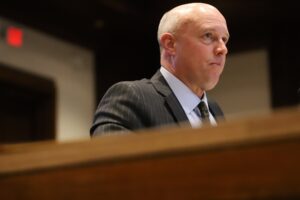
Mike Kennealy, secretary of housing and economic development, said at a hearing Feb. 11, 2020 that the administration will prioritize rental vouchers and affordable housing investments but cannot spend its way of the housing crisis. State House News Service Photo | Chris Van Buskirk
Gov. Charlie Baker and his top deputies continue to push lawmakers to advance their bill that would lower the voting threshold required for local zoning changes, a measure that’s failed to gain traction among lawmakers.
While all parties have long agreed on the need for action, the legislature and administration still do not appear to be on the same page on what should be done. House Democratic leaders have offered few indications of how they plan to tackle housing this session, and Senate President Karen Spilka hinted last month she wants to do more than zoning reform.
The split in approach was apparent during a House Committee on Bonding, Capital Expenditures and State Assets oversight hearing Tuesday.
Rep. Mike Connolly, a Cambridge Democrat who has called for sweeping housing legislation including local option rent control and taxing large companies to fund affordable housing, pressed Housing and Economic Development Secretary Mike Kennealy on the idea of raising more revenue and directing it toward production.
Kennealy replied that the administration will continue to prioritize affordable housing investments, but that he believes Massachusetts cannot spend its way out of the crisis. Meeting the state’s needs, he said, can only be done if private developers recommit to robust production.
“There’s simply not enough government subsidy available to create the housing numbers we need,” Kennealy said.
Senate Signals Broader Approach
In December, the Housing Committee advanced a version of Baker’s bill (H.4263), which would allow communities to make zoning changes with only a simple majority vote rather than a two-thirds majority vote as is currently required. The legislation is now pending before the House Ways and Means Committee, where it died last session.
Kennealy told the News Service the administration is “having a lot of different conversations” about the bill, but declined to comment more on the legislature’s deliberations.
Last month, Spilka told WGBH that she was “thrilled” to see the Housing Committee report out Baker’s bill but that the Senate would likely take a wider approach.
“If we could create more affordable housing in communities, people could live closer to where they work and wouldn’t have to drive for an hour and a half to get to their job,” she said, noting that housing is a “crisis” in Massachusetts. “These are issues that deeply concern the Senate, so we’re taking a look at a little broader housing bill than what the governor introduced. And I’m thrilled that the housing bills finally came out of the Housing Committee, so we are working on that, as well.”
Connolly argued at Tuesday’s hearing that zoning changes will not guarantee new production, even if some projects have been stunted by the two-thirds majority required for zoning changes.
The 45-acre former Cambridge Crossing development site, he said, was zoned for more than 2,000 units of new housing 15 years ago but the “vast majority” of those have not yet been built.
“The zoning is all in place, but we have to wait for someone who has the money and decides they can make enough money to put that money into the investment,” Connolly said. “With the kind of economy we have where people are looking to find the best return on investment, I don’t think we can rely too much on the market to serve those who have low incomes, very low incomes, and all the way up the chain of working-class families.”
Baker Plans New Bill Soon
Housing is one of the priorities outlined in an economic development plan Baker unveiled in December, and the bill – which Kennealy said should be unveiled “later this month or early next month” – will map “pretty closely” to those priorities, Kennealy said in an interview.
“We might think about, in the economic development bill, other ways to support housing production, but at its root, it’s a production issue,” he said in an interview. “When you have housing production cut in half over a 30-year period, we really need the market to come back and respond. It’s got to be a balanced approach through government investments, technical assistance, our Housing Choice capital program, and, we think, the targeted zoning reform of the bill.”
Between 1960 and 1990, Massachusetts produced 900,000 new units of housing, Kennealy said. But between 1990 and today, the state only generated 435,000 new units, even as the economy and population grew.
The state needs 135,000 additional units needed to meet current demand, he said.
Since Baker took office, Kennealy said, the administration has spent $1.2 billion and generated more than 15,000 affordable housing units while also supporting rental vouchers and other programs.
“We’re doing a lot of things the government can and should do at record levels, but there’s no escaping the fact we need the housing production market overall to produce more housing, and that’s where the Housing Choices legislation comes in,” Kennealy said. “Local zoning barriers are real, and if we can make it easier for communities to develop the kind of housing they want to develop, we’re going to see a lot more housing of all types.”






